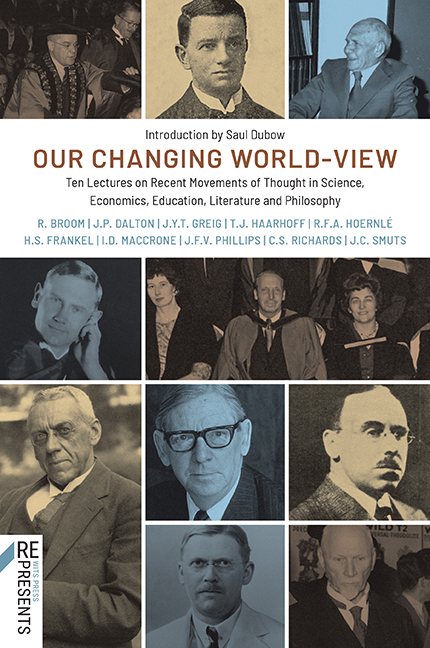 Our Changing World-View
Our Changing World-View Book contents
- Frontmatter
- Contents
- Introduction
- Preface
- Miscellaneous Frontmatter
- 1 Some Recent Scientific Advances in Their Bearing on Philosophy
- 2 The Material World—Yesterday and Today
- 3 Evolution—Design or Accident?
- 4 Man at the Crossroads
- 5 Psychology in Perspective
- 6 Literature in the Machine Age
- 7 The Holistic Attitude in Education
- 8 Our Changing Economic World
- 9 Africa in the Re-Making
- 10 Old Truths and New Discoveries
Introduction
Published online by Cambridge University Press: 12 October 2021
- Frontmatter
- Contents
- Introduction
- Preface
- Miscellaneous Frontmatter
- 1 Some Recent Scientific Advances in Their Bearing on Philosophy
- 2 The Material World—Yesterday and Today
- 3 Evolution—Design or Accident?
- 4 Man at the Crossroads
- 5 Psychology in Perspective
- 6 Literature in the Machine Age
- 7 The Holistic Attitude in Education
- 8 Our Changing Economic World
- 9 Africa in the Re-Making
- 10 Old Truths and New Discoveries
Summary
This remarkable volume, published in a handsome red cloth edition with gold lettering, can be read as a statement of aspiring confidence on the part of a young, civic university, asserting its maturation as a centre of serious and engaged scholarship. In 1932, Johannesburg was still a brash mining town, better known for the production of wealth than knowledge. Merely a decade had passed since the University of the Witwatersrand's incorporation, by parliamentary statute, as a university. In 1932 it had a student enrolment of just 1 782, taught by forty professors and forty-five permanent staff. The beginnings of a shift from investment in mining to investment in cultural capital was clearly underway.
On Christmas Eve, 1931, a fire entirely destroyed the university library and its invaluable Gubbins Africana collection, housed on top of a temporary wood and iron structure in the Central Block. There was no contents insurance to make good the damage. This book was in significant measure part of an ambitious programme of reconstruction. It was conceived as a way of raising public awareness of the need for rebuilding by demonstrating Wits’ special role in the civic life of Johannesburg and its intellectual standing in the country. The fire was a baptism: notwithstanding the economic depression then engulfing the country (Wits suffered a 20 per cent cut in its state subsidy in 1932), substantial finance was raised by a special appeal fund. Progress was swift. A handsome new library, architecturally inspired by the Petit Trianon in the gardens of Versailles, was opened in 1934 by Prince George, Duke of Kent. The building was named after William Cullen, a Scottish chemist and metallurgist with interests in education, whose close links to the mining industry positioned him to spearhead the building campaign. Remarkably, half of the 60 000 volumes acquired by this time were donated.
Our Changing World-View: Ten Lectures on Recent Movements of Thought in Science, Economics, Education, Literature and Philosophy was therefore published in the midst of an interregnum. Four years after his appointment in 1928, the new principal, Humphrey Raikes, was yet to be confirmed in post by Council – a process that had been much delayed by internal political wrangling.
- Type
- Chapter
- Information
- Our Changing World-ViewTen Lectures on Recent Movements of Thought in Science, Economics, Education, Literature and Philosophy, pp. vii - xviPublisher: Wits University PressPrint publication year: 2021


